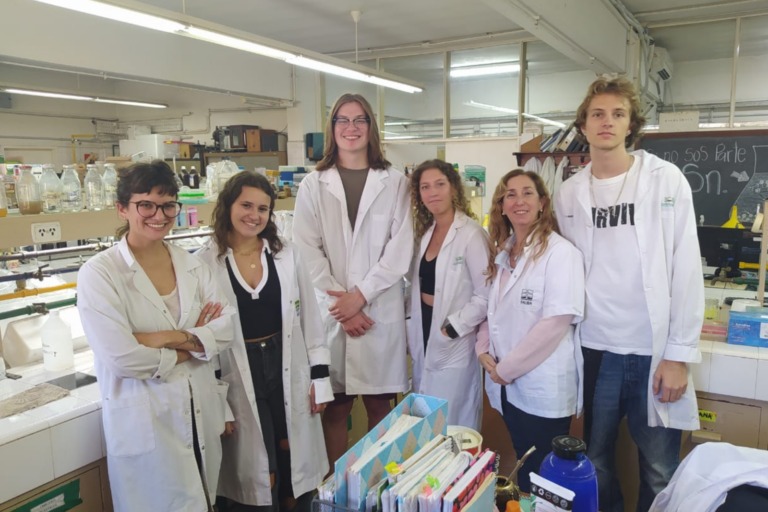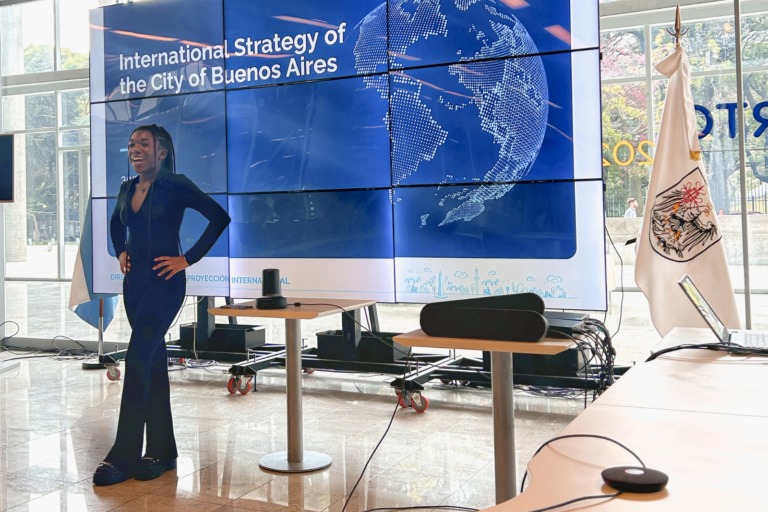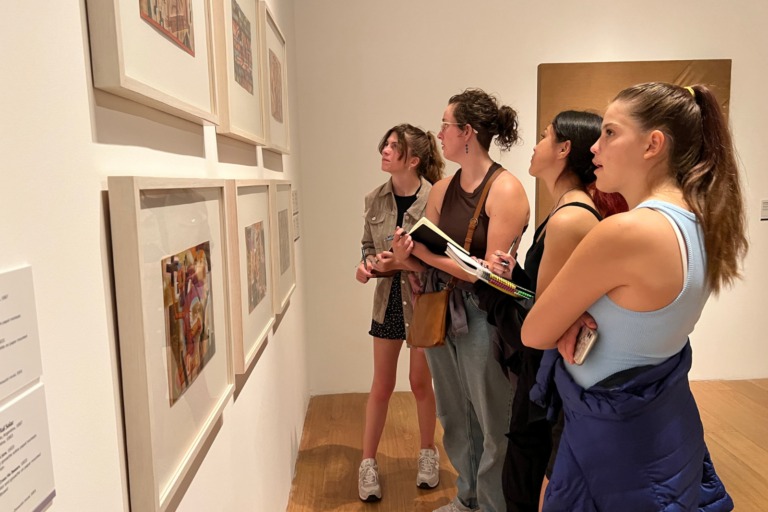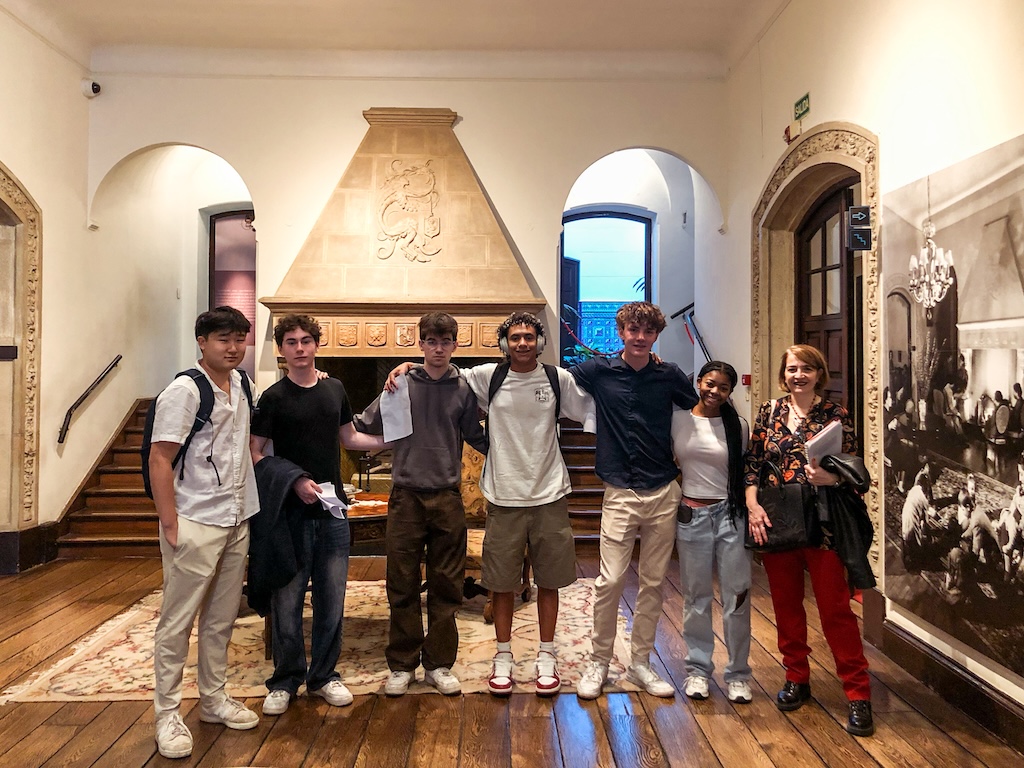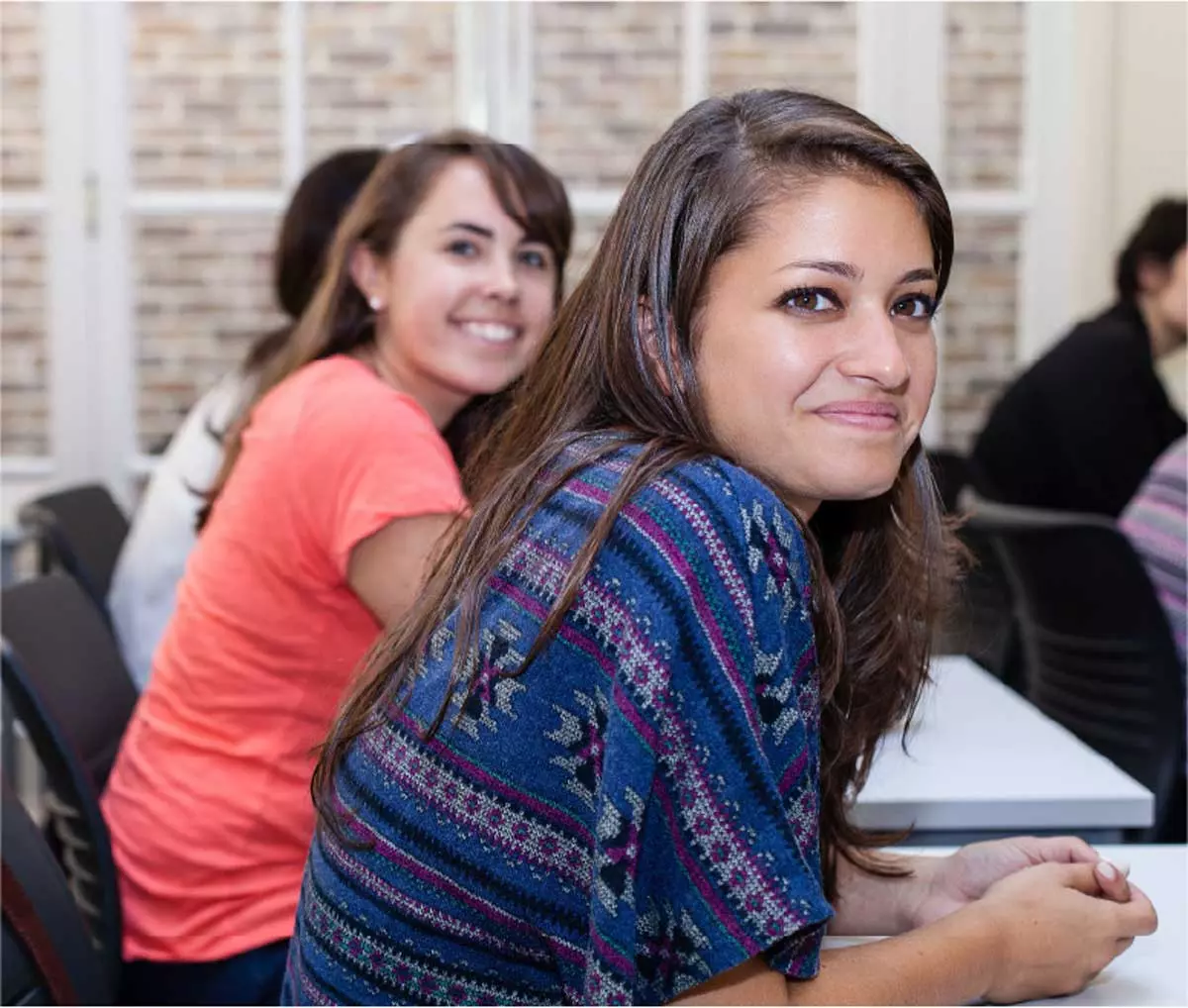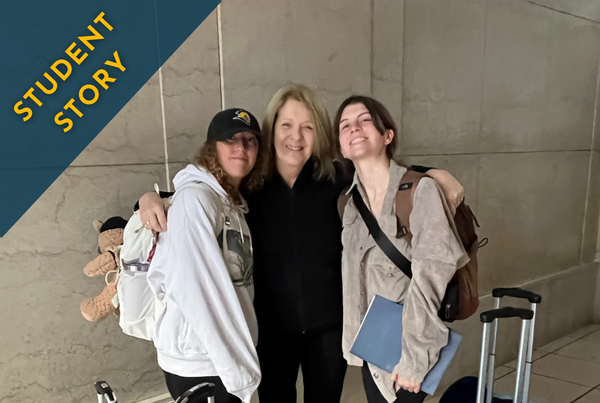
STUDY ABROAD IN
BUENOS AIRES,
ARGENTINA
DISCOVER THE WORLD in Buenos Aires, Argentina
Study abroad in Buenos Aires and experience the cosmopolitan lifestyle of Argentina’s capital. From its welcoming people and rich cultural scene to legendary cuisine, vibrant music, and popular sports — you’ll find it all.
Dates & Deadlines
- Fall ’26: Aug. 24 – Dec. 5 (Enroll by 7/1/26)
- Spring ’27: Mid Feb. – late May
Requirements
- Must be 18 by the program start date
- Valid Passport
Program Cost
- Fall ’26+: $18,750* before study abroad scholarships or grants
*A $2,500 administrative fee applies for non-U.S. citizens/non-U.S. permanent residents.
College Credits
- 12-17 Credits from our Academic Provider, the University of New Haven
Accommodations
- Homestays, Student Residences, or Apartments (Fall Only)
WHAT WILL MY LIFE LOOK LIKE in Buenos Aires
Get involved with the local community by joining student clubs or participating in a variety of weekly activities like Tango classes, soccer matches, or Care Team hangouts. During your free time, explore the colorful neighborhoods of Buenos Aires, visit world-class museums like MALBA, or take part in cultural excursions for a once-in-a-lifetime journey.
Getting around Buenos Aires: Buenos Aires is the safest capital city in Latin America, and students can easily go to class by public transportation or by foot. Vertoans receive full support to navigate the city independently and can join various extracurricular activities and day trips organized by Verto, including the River Delta or a typical Argentine ranch.
Excursions & Activities
Possible Argentina Study Abroad Excursions:
Day Trips: Explore fascinating locations like Colonia (Uruguay) or the Tigre Delta.
Overnight Trips: Enjoy an overnight adventure to Iguazu Falls (spring and fall), Bariloche, or Peninsula Valdes (fall only)!
Cultural Experiences: Attend a Buenos Aires fútbol (soccer) match, watch tango in the streets, and participate in traditional mate-drinking ceremonies.
Additional Activities: Enjoy the local food scene, relax in picturesque parks like Bosques de Palermo, and participate in lively arts and musical events.
Excursions are subject to change based on availability each semester, ensuring a dynamic and enriching experience.
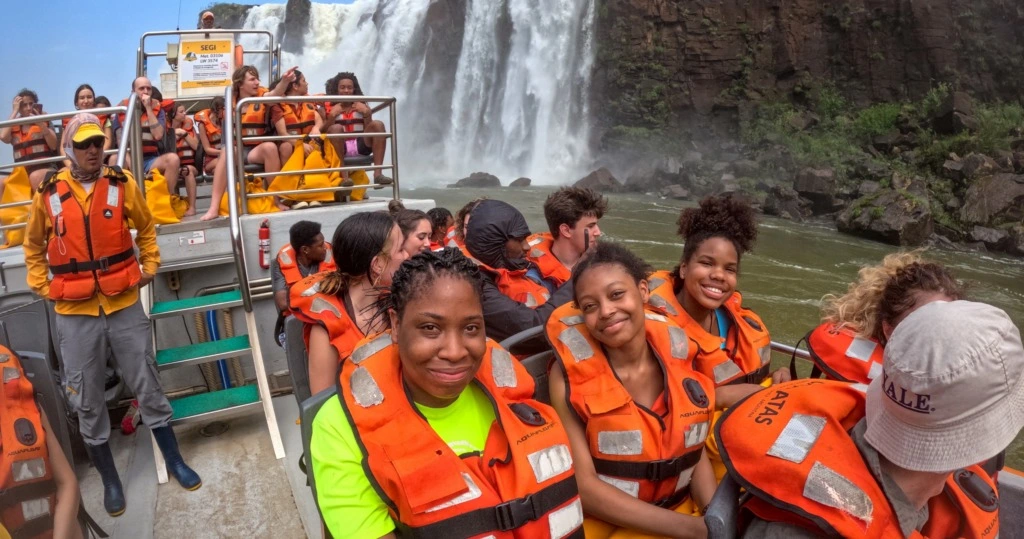
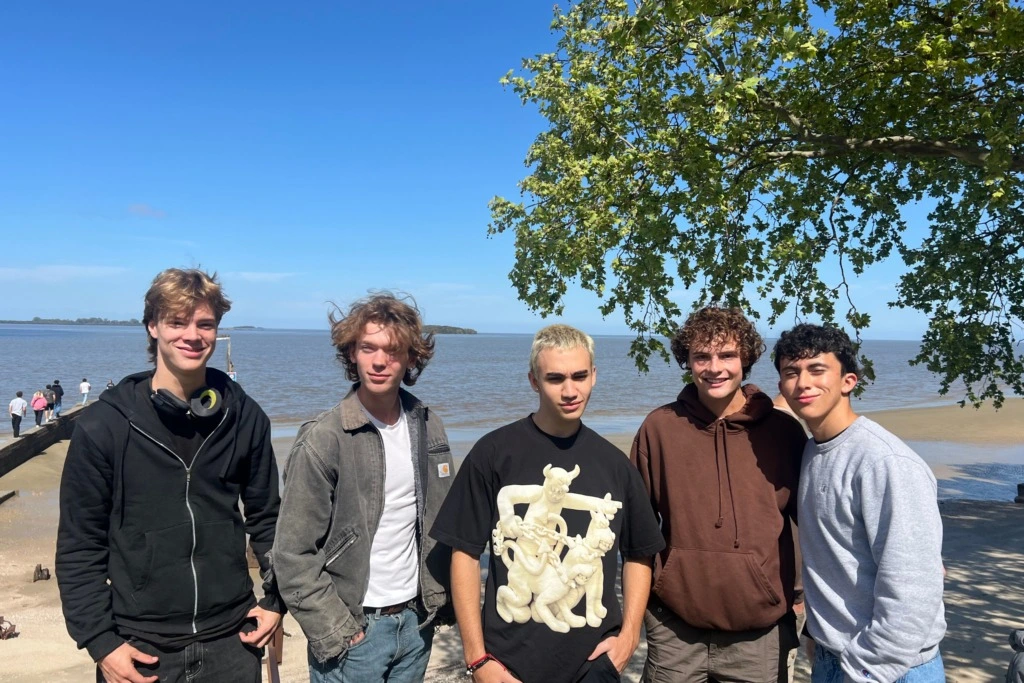
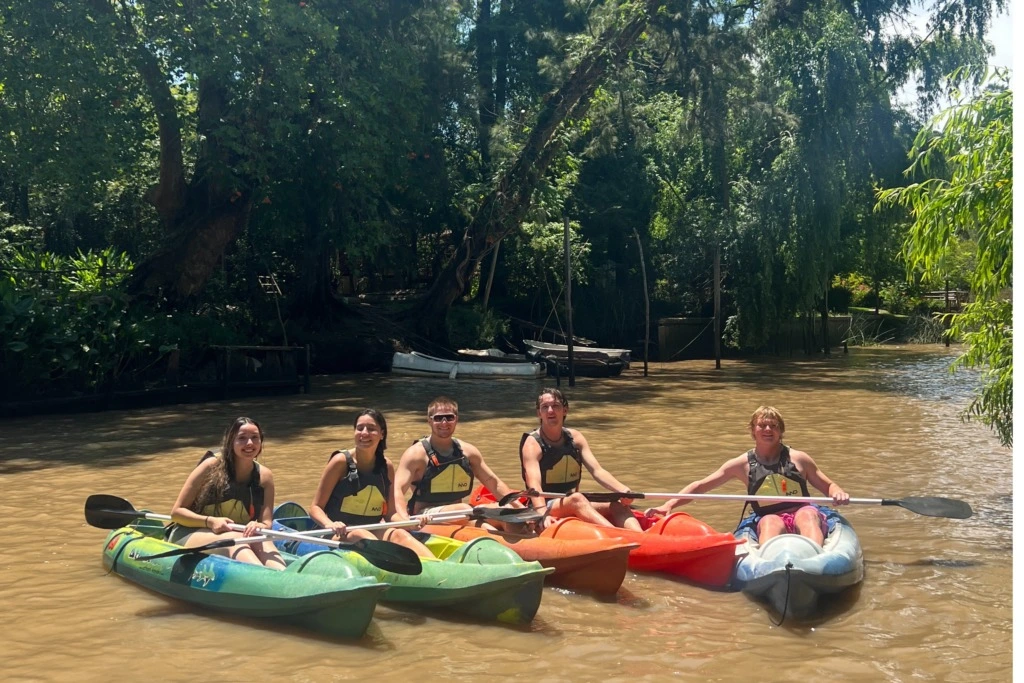
Accommodations
& Meals
Choose Your Home in Buenos Aires
Vertoans can choose between a homestay with a local family or a student residence shared with other Verto participants. Apartment housing is also offered during the fall semester only.

Verto Argentina Study Center
Situated in the Recoleta neighborhood, the Verto study center in Buenos Aires offers a prime location. You can easily walk to major attractions like the Japanese Gardens, the National Museum of Fine Arts, and bustling local markets. The central location means you’re always close to the action, whether it’s a musical performance, a historic plaza, or a trendy café in Palermo.
ACADEMICS in Buenos Aires
While you study abroad in Buenos Aires, Argentina, you’ll earn transferable college credits from Verto’s Academic Provider, the University of New Haven.
Verto’s Unique Academic Experience:
Small Class Sizes with Caring Professors: Enjoy personalized attention and engaging learning environments with an average classroom size of 16.
Excursions and Hands-On Learning Opportunities: Step outside of the classroom as you experience the culture and history of Buenos Aires through immersive activities.
Academic Support & Advising: Receive customized support to strengthen your academic skills, access resources like study groups and tutoring, and get 1:1 guidance on your journey to achieving your goals.

Buenos Aires Academic Spotlight: Business, Sport & Culture
Business & Entrepreneurship, Globalization of Sport, Spanish (6 levels), Music, Modern Latin America, Cultural Understanding of Food & Cuisine, Environmental Studies
Buenos Aires Course Spotlight
*All classes at Verto locations are delivered by our accredited Academic Provider, the University of New Haven.
Course Information
Advanced Spanish Conversation
This advanced course is designed to focus on students’ interpersonal, interpretative, and presentational skills, while helping them further develop their spoken level of proficiency in Spanish. Students will be exposed to the cultural diversities of the Spanish-speaking countries by means of a broad range of topics, readings, musical recordings, and films. All these elements will spark students’ imagination, will generate controversy for in-class debates, and will provide the opportunity to practice the linguistic skills needed for oral and written communication (listening comprehension, writing, reading comprehension, and socio-cultural competence).
Calculus I
The first year college course for majors in mathematics, science and engineering; and the basic prerequisite for all advanced mathematics. Introduces differential and integral calculus for functions of one variable, including algebraic and transcendental functions and culminates in the fundamental theorem of calculus. Includes basic rules and properties of limits and derivatives and applications of derivatives. Studies the plane analytic geometry needed for calculus.
College Algebra
A review of the fundamental operations and an extensive study of functions, exponents, radicals, linear and quadratic equations. Additional topics include ratio, proportion, variation, progression and the binomial theorem. This course is intended primarily for students whose program of study requires calculus or business math.
Cultural Anthropology
A systematic study of the culture of preliterate and modern societies and of cultural change. Includes analyses of religion, economics, language, social and political organization and urbanization.
Cultural Understanding of Food and Cuisine
The importance of food and cuisine within the context of society. This course will explore the impact of food on the evolution of mankind and address issues relating to the importance of food in the political and economic structure of the world. Questions regarding food supplies and sources as well as ethical questions facing mankind in the near future will be examined. Also explored will be the influences and perceptions of food in different cultures of the world and how those perceptions affect intercultural understanding.
Elementary Spanish I
Focuses on the fundamental principles of grammar. Extensive vocabulary and pronunciation exercises.
Elementary Spanish II
Focuses on the fundamental principles of grammar. Extensive vocabulary and pronunciation exercises. Aural comprehension and pronunciation are tested by oral examination.
Elementary Statistics
Topics include: basic probability theory; random variables and their distributions; estimation and hypothesis testing; regression; and correlation. This course is not calculus-based, and places an emphasis on an applied approach to statistical theory with applications chosen from the biological sciences and other fields of study. Students will be introduced to and make use of a computer package for data analysis.
Entrepreneurship
Covers the entrepreneurial process from conception to operation of a new enterprise. Concentrates on the characteristics of entrepreneurs and the process by which they turn creative ideas into a new enterprise. The emphasis will be on how entrepreneurs can create value for themselves, their investors, their immediate communities, and other stakeholders.
Environmental History
This course investigates the development of natural and built environments in modern times. The problems of global warming are a recent manifestation of environmental problems. Institutional, cultural, and political changes came with the construction of cities, industries, and infrastructures, resulting in problems with air, water, land, and energy. These local and global environmental issues may reflect an unsustainable relationship with nature.
Ethics
How shall one live? Critical examination of answers proposed by classic and modern philosophers of the major world traditions.
Foundations for Success
Foundations for Success is a unique one-credit course designed with the purpose of guiding students through the transition between high-school and college life. With a focus on developing essential skills that are integral for success both in and beyond the classroom, this course will equip first-year students with the tools necessary to thrive academically, socially, and personally. Our holistic approach recognizes the importance of intellectual, emotional, social, ethical, and physical development, making this course a powerful tool for growth and self-awareness. Through interactive coursework, students will learn how to cultivate lifelong learning skills, foster community, build resilience, and achieve personal success at every level.
Globalization of Sport
Sport is a universal element in all cultures. It is a key to social identification and building cultural capital. With the globalization of sports and commercialization of international sports, sports have been utilized as a soft power. This course focuses on the role of sport in global society. Throughout the course, students compare traditional and modern-day sports in different regions of the world to gain an understanding of the role sports play in various cultures. Students also engage with geographic and sociopolitical histories through exposure to international sport events.
History of Art II
This course introduces students to works of art from the Renaissance period to the mid-20th century. The course explores the expressive, social, cultural, political, economic, and technological aspects of societies as reflected in their art.
Intermediate Spanish I
Stresses the reading comprehension of modern prose texts and a review of grammar necessary for this reading. Students are encouraged to read in their own areas of interest.
Intermediate Spanish II
Stresses the reading comprehension of modern prose texts and a review of grammar necessary for this reading. Students are encouraged to read in their own areas of interest.
Introduction to Environmental Science w/ Lab
Today’s environmental problems have scientific, social, and political aspects to them. This course, which is required for majors and is suitable for non-majors, will focus on the scientific aspects but will not ignore the other two. The student will be introduced to the geology, biology, physics, and chemistry behind the problems and to the social and political difficulties inherent in dealing with them. Through a combination of lectures, case histories, in-class discussions, and observation of the environmental decision-making process at work, the student will gain an understanding of the complex nature of environmental problems and of the choices that must be made in solving them.
Introduction to Microeconomics
Microeconomics including markets and market structure and the allocation of resources. The distribution of income, the public economy, the international economy, and selected economic problems.
Introduction to Music
Basic forms and styles of music in the Western World; music appreciation.
Introduction to Philosophy
The nature of reality and how it may be known, according to the great thinkers of the West and the East.
Introduction to Psychology
This course will provide students with a basic understanding of psychology as a science. It will introduce students to research methods, principles of learning, development, biological bases of behavior, psychological disorders, and social psychological phenomena. Additional topics may include cognition, sensation and perception, sleep, intelligence, and personality. Ethical issues within the field will also be examined.
Making Modern Latin America
Latin American nations formed as people around the world worked out what modern ideals like freedom and equality meant in the context of multicultural countries. In this class, students will engage with various historical methods and sources-with a focus on primary sources-to investigate how Latin American leaders and citizens balanced their desires for political ideals like equality and democracy and pressures to create modern industrial economies from the vestiges of colonial rule and ongoing imperial pressures. In addition to a basis for understanding modern Latin America, students will leave this class with solid experience analyzing documents and data that they can apply to future classes or their careers.
Politics of Globalization
This course will provide students a clear understanding of the emerging trends of globalization with a special focus on what led to the beginning of these trends and what are its current patterns. The course will also focus on the most recent “global flows” and their impact including global economic flows as reflected in the growing international trade, global political flows as observed in the internationalization of political issues, global cultural flows as discerned through cultural convergences, and global technological flows as witnessed by the internet revolution. In addition, the course will study the politics of globalization with an analysis of the differential impact of globalization on the developing and the developed world.
Pre-Calculus
Topics include: polynomials; algebraic functions; plane analytic trigonometry; and properties of exponential, logarithmic, and trigonometric functions. This course offers the foundation needed for the study of calculus.
Quantitative Reasoning
Topics include: sets; basic logic; enumeration and elementary probability; mathematical applications of personal finance; and basic statistics.
Seminar in Academic Inquiry and Writing
This course introduces students to the conventions of academic writing and the habits of critical inquiry they will need in university courses and beyond. Students read and annotate texts on a topic (or topics) selected by the instructor, develop original avenues of inquiry through classroom discussion, and transform their questions into well-supported academic arguments. Assignment sequences incorporate opportunities for research, drafting, revision, editing, and reflection to help students find writing processes that can be replicated in future courses and workplace projects that require only polished work. Because different disciplines and career paths present different scenarios for critical thinking and writing, this course also teaches students how to adapt the conventions of academic inquiry to a variety of contexts.
Cultural Understanding of Food and Cuisine
The importance of food and cuisine within the context of society. This course will explore the impact of food on the evolution of mankind and address issues relating to the importance of food in the political and economic structure of the world. Questions regarding food supplies and sources as well as ethical questions facing mankind in the near future will be examined. Also explored will be the influences and perceptions of food in different cultures of the world and how those perceptions affect intercultural understanding.
Elementary Spanish I
Focuses on the fundamental principles of grammar. Extensive vocabulary and pronunciation exercises.
Elementary Spanish II
Focuses on the fundamental principles of grammar. Extensive vocabulary and pronunciation exercises. Aural comprehension and pronunciation are tested by oral examination.
Elementary Statistics
Topics include: basic probability theory; random variables and their distributions; estimation and hypothesis testing; regression; and correlation. This course is not calculus-based, and places an emphasis on an applied approach to statistical theory with applications chosen from the biological sciences and other fields of study. Students will be introduced to and make use of a computer package for data analysis.
Entrepreneurship
Covers the entrepreneurial process from conception to operation of a new enterprise. Concentrates on the characteristics of entrepreneurs and the process by which they turn creative ideas into a new enterprise. The emphasis will be on how entrepreneurs can create value for themselves, their investors, their immediate communities, and other stakeholders.
Globalization of Sport
Sport is a universal element in all cultures. It is a key to social identification and building cultural capital. With the globalization of sports and commercialization of international sports, sports have been utilized as a soft power. This course focuses on the role of sport in global society. Throughout the course, students compare traditional and modern-day sports in different regions of the world to gain an understanding of the role sports play in various cultures. Students also engage with geographic and sociopolitical histories through exposure to international sport events.
Intermediate Spanish I
Stresses the reading comprehension of modern prose texts and a review of grammar necessary for this reading. Students are encouraged to read in their own areas of interest.
Introduction to Psychology
This course will provide students with a basic understanding of psychology as a science. It will introduce students to research methods, principles of learning, development, biological bases of behavior, psychological disorders, and social psychological phenomena. Additional topics may include cognition, sensation and perception, sleep, intelligence, and personality. Ethical issues within the field will also be examined.
Making Modern Latin America
Latin American nations formed as people around the world worked out what modern ideals like freedom and equality meant in the context of multicultural countries. In this class, students will engage with various historical methods and sources-with a focus on primary sources-to investigate how Latin American leaders and citizens balanced their desires for political ideals like equality and democracy and pressures to create modern industrial economies from the vestiges of colonial rule and ongoing imperial pressures. In addition to a basis for understanding modern Latin America, students will leave this class with solid experience analyzing documents and data that they can apply to future classes or their careers.
Politics of Globalization
This course will provide students a clear understanding of the emerging trends of globalization with a special focus on what led to the beginning of these trends and what are its current patterns. The course will also focus on the most recent “global flows” and their impact including global economic flows as reflected in the growing international trade, global political flows as observed in the internationalization of political issues, global cultural flows as discerned through cultural convergences, and global technological flows as witnessed by the internet revolution. In addition, the course will study the politics of globalization with an analysis of the differential impact of globalization on the developing and the developed world.
INCLUDED WITH Your Experience
We recommend budgeting $700-900 USD per month for personal expenses. Your budget will mostly depend on your spending habits, especially for independent travel.
Talk to your family about budgeting expectations before you arrive. You don’t want to blow your whole budget on empanadas! (Or do you…?!)
Included With Your Study Abroad Program
- All accommodation while overseas
- 2 meals per day (homestays only)
- All scheduled activities, excursions, and events
- Books and other course materials
- Travel medical insurance
- Airport pickup on the designated arrival date
- 24/7 emergency assistance
International airfare, change fees, visa and passport fees, public transportation, and meals at residences and apartments are not included.
Check out these Vertoan’s tips on keeping to your budget while abroad!
On-Site Support
We’ll walk alongside you every step of your study abroad journey. From pre-departure guidance and virtual workshops to on-site mentorship, academic support, and community-building activities, we ensure you have the support you need for an enriching experience abroad. Plus, our team is here to help with your college planning and life after Verto, providing personalized advice and transfer support to set you up for future success. Learn more about student support here!
Scholarships & Institutional Aid
Verto is committed to increasing equity, access, inclusion, and diversity in study abroad and higher education — regardless of your financial background.
About half of Verto participants receive study abroad scholarships, institutional aid, or both. For eligible participants, Verto can significantly reduce the study abroad cost through Verto’s Global Citizen Scholarship. You can also apply for external grants and scholarships to further reduce your study abroad cost.
How to Apply to Verto Buenos Aires
The first step is to fill out our free study abroad application. There’s no obligation and it only takes a few minutes to complete the online form.
After your application is submitted, you’ll be matched with a counselor who can answer any and all of your questions. Ready to get started?
